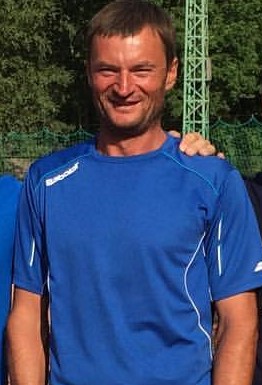Alexander Volkov (tennis) facts for kids
 |
|
| Country (sports) | |
|---|---|
| Born | 3 March 1967 Kaliningrad, Soviet Union |
| Died | 19 October 2019 (aged 52) Kaliningrad, Russia |
| Height | 1.88 m (6 ft 2 in) |
| Turned pro | 1988 |
| Retired | 1998 |
| Plays | Left-handed (two-handed backhand) |
| Prize money | $3,362,840 |
| Singles | |
| Career record | 303–255 |
| Career titles | 3 |
| Highest ranking | No. 14 (23 August 1993) |
| Grand Slam singles results | |
| Australian Open | 4R (1994) |
| French Open | 3R (1990, 1992) |
| Wimbledon | 4R (1987, 1990, 1991, 1994) |
| US Open | SF (1993) |
| Other tournaments | |
| Grand Slam Cup | 1R (1992, 1993) |
| Olympic Games | 1R (1988) |
| Doubles | |
| Career record | 32–55 |
| Career titles | 0 |
| Highest ranking | No. 136 (9 October 1989) |
| Grand Slam doubles results | |
| Wimbledon | 2R (1988) |
| US Open | 1R (1989) |
| Other doubles tournaments | |
| Olympic Games | 1R (1988) |
| Team competitions | |
| Davis Cup | F (1994, 1995) |
Alexander Vladimirovich Volkov (Russian: Алекса́ндр Влади́мирович Во́лков; born March 3, 1967 – died October 19, 2019) was a professional tennis player from Russia. He was known for his strong serve and powerful groundstrokes.
Contents
Volkov's Tennis Journey
Alexander Volkov started his professional tennis career in 1988. He quickly showed his talent on the court.
Early Career & Big Wins
In 1989 and 1990, Volkov reached the finals of three different tournaments. Even though he didn't win those, he made a big splash at the US Open in 1990. There, he surprised everyone by beating the world's number one player, Stefan Edberg, in a straight-set match.
Volkov won his very first major professional title in 1991 in Milan, Italy. That same year, he played a memorable match at Wimbledon. He lost a very close match to Michael Stich, who later won the tournament. The match was decided by a lucky shot from Stich that hit the net post and landed in.
More Titles & Important Matches
In 1992, Volkov was a runner-up in three more tournaments. He then won his second title in 1993 in Auckland, New Zealand. Later that year, he played against the legendary Björn Borg at the Kremlin Cup in Moscow. Volkov won, and this match turned out to be the last one Borg ever played in his career.
Volkov returned to the Kremlin Cup in 1994 and won it, claiming his third and final career title. He reached one more final in Shanghai in 1997.
Grand Slam Success
His best performance in a Grand Slam tournament was at the 1993 US Open. He made it all the way to the semifinals! To get there, he defeated several strong players like Thomas Muster. He eventually lost to Pete Sampras, who was one of the best players at the time.
Playing for His Country
Volkov was an important part of the Russian team in the Davis Cup. This is a big international team competition in tennis. In 1994, he helped Russia reach the final. He won his singles matches against players from Australia and Germany. However, Russia lost to Sweden in the final.
Retirement & Coaching
Alexander Volkov retired from professional tennis in 1998. His highest singles ranking was world No. 14, which he reached in 1994. Throughout his career, he earned over $3.3 million in prize money. After retiring, he became a coach for a while, even coaching fellow Russian tennis star Marat Safin.
Career Highlights in Numbers
During his career, Alexander Volkov played in 11 singles finals, winning 3 titles and finishing as runner-up 8 times. He also reached 3 doubles finals. Before joining the main tour, he won one Challenger tournament.
He played in all four Grand Slam tournaments many times:
- Australian Open: Reached the fourth round once.
- French Open: Reached the third round twice.
- Wimbledon: Reached the fourth round four times.
- US Open: Reached the semifinals once.
Volkov also had 17 wins against players ranked in the top 10 in the world. This shows he could beat the very best in tennis!
Junior Tennis
As a junior player, Alexander Volkov also had success. In 1985, he reached the doubles final at the French Open with his partner Vladimer Gabrichidze.
See also
 In Spanish: Aleksandr Vladímirovich Vólkov para niños
In Spanish: Aleksandr Vladímirovich Vólkov para niños
 | Misty Copeland |
 | Raven Wilkinson |
 | Debra Austin |
 | Aesha Ash |

